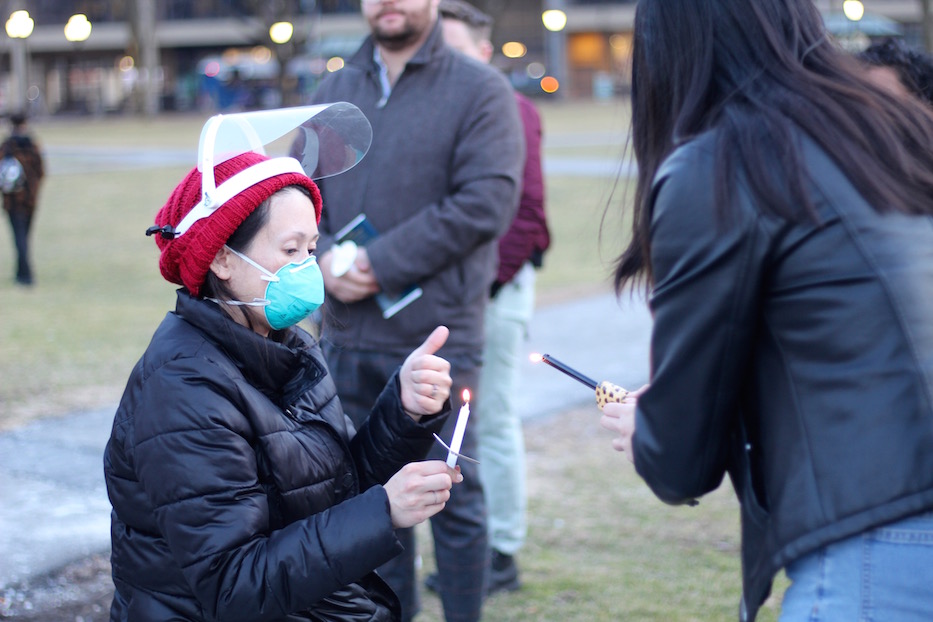
Culture & Community | Downtown | Arts & Culture | Arts & Anti-racism | AAPI New Haven | Yale AACC
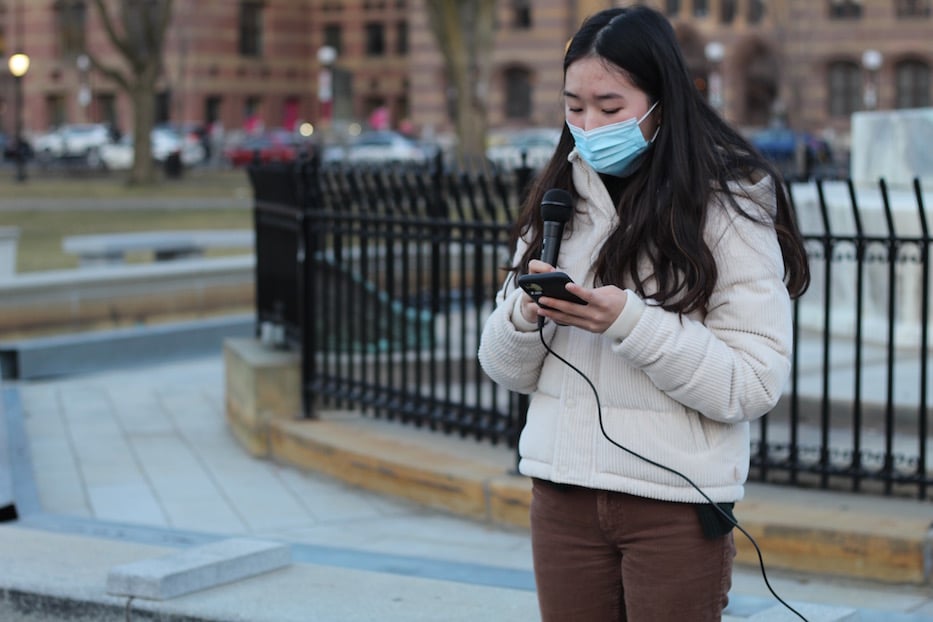
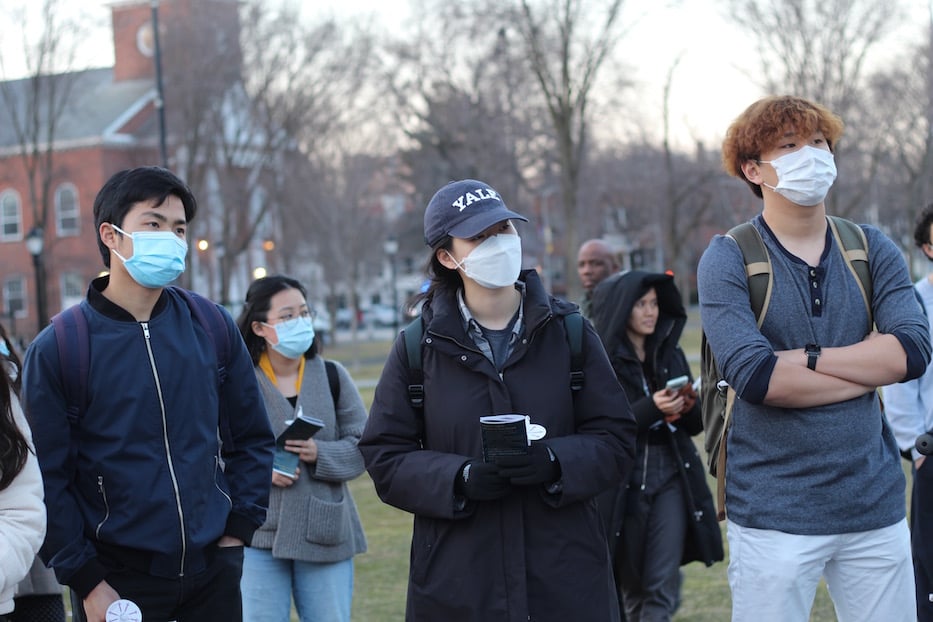
Top: Sheena Kwon, who is a freshman at Yale University and a member of Korean American Students at Yale. Bottom: Students at the vigil. Lucy Gellman Photos.
In the victims of the Atlanta spa shootings, Sheena Kwon saw women who could have been members of her family. JiJi Wong's mind went to Yang Song, a 38-year-old Chinese American woman who fell four stories to her death during a police raid in Queens. Diza Hendrawan remembered being 14 years old the first time a teacher called them "exotic."
All of them brought their stories to the New Haven Green Wednesday night, during a one-year vigil for victims of the Atlanta spa shootings that became an intersectional call for housing justice, safer conditions for sex workers, food security, and an end to overpoliced communities of color. The hour-long event both honored the eight victims of the shootings, six of whom were Asian American women, and wove their stories into a centuries-long history of anti-Asian racism and white supremacy.
The event was organized by members of aapiNHV, which formed in the aftermath of the shootings last year, and students and faculty at the Asian American Cultural Center (AACC) at Yale. Five or six dozen attended, many holding candles that kept going out in the cold and wind.
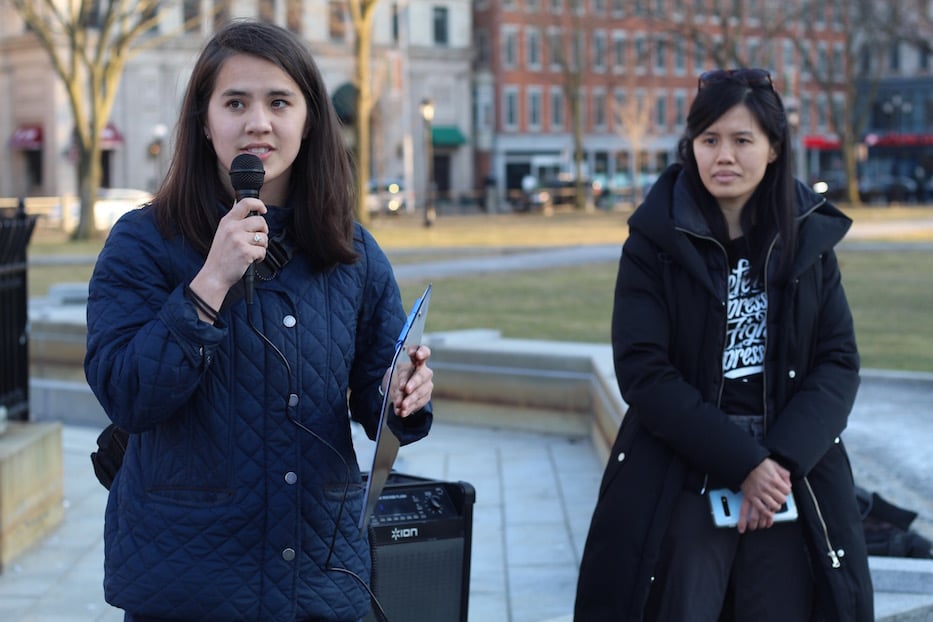
Caroline Tanbee Smith, a member of AAPI New Haven, and Dean Joliana Yee, director of the Asian American Cultural Center. "Tonight, we also call for respect, dignity and rights of all sex workers and massage workers and migrant workers," Smith said at the beginning of the vigil. "That means we stand in solidarity and demand justice for our Black and Latinx brothers, sisters and others. Everywhere, including right here in Connecticut."'
"Someone once told me that grief is like its own country," said Dean Joliana Yee, director of the Asian American Cultural Center at Yale. "It's difficult to understand unless you've spent time there. And while our concept of time tends to be very linear, the way we experience grief isn't linear at all. So I hope each of you are able to be gentle with yourselves and others who are grieving in our own time, in our own space, and in our own ways."
From the moment speakers took the mic, they centered a collective, shared and sustained grief that runs centuries deep. Victims of the spa shootings include Soon Chung Park, Hyun Jung Grant, Suncha Kim, Yong Ae Yue, Delaina Ashley Yaun, Xiaojie Tan, Daoyou Feng, and Paul Andre Michels. While six of the eight victims were Asian American women and the shooter spoke openly about harming Asian women in the weeks before the attacks, the Atlanta Police Department did identify the shootings as a racially motivated hate crime.
Yet the victims do not, speakers noted again and again, represent a monolithic block. They were big-hearted grandmothers, scrappy mamas who would do anything for their kids, first-generation trailblazers who could rock a yoga lesson, adoring aunties and small business owners who worked long shifts to send their kids to college. They had names that reporters could and should have learned to pronounce before going on the air. Their most immediate bond is that they were taken from the world much too prematurely, by a white person who saw them as objects and wielded a weapon of war. Their deaths come in a two-year period that has seen a sharp increase in hate crimes against Asian Americans.
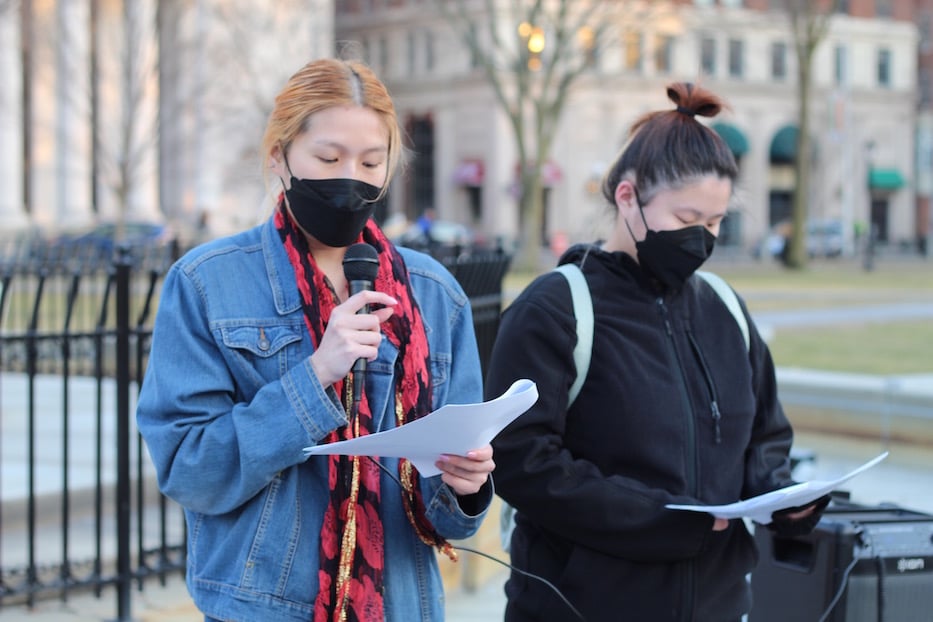
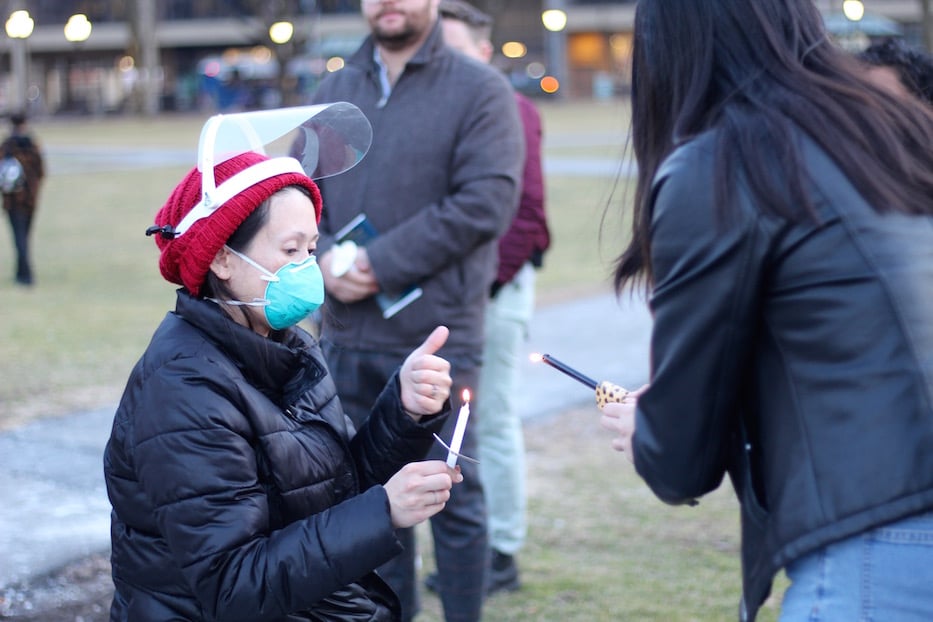 Top: JiJi Wong and Kelly Chow. Together, they took the audience through over 200 years of U.S. history that has been informed by anti-Asian racism, particularly Sinophobia. Bottom: Attendees lit candles at the beginning and during the latter half of the vigil.
Top: JiJi Wong and Kelly Chow. Together, they took the audience through over 200 years of U.S. history that has been informed by anti-Asian racism, particularly Sinophobia. Bottom: Attendees lit candles at the beginning and during the latter half of the vigil.
As they opened with a land acknowledgement, JiJi Wong and Kelly Chow tied repeated acts of anti-Asian racism and particularly Sinophobia to a long history of legislation meant to vilify, objectify, and exclude Asian women. At turns, Chow said, these boil down to two equally harmful stereotypes: "the menacing, sexually manipulative dragon lady and the docile, submissive lotus blossom." Nowhere are they more insidious than when filtered through an anti-Chinese lens, the aftershocks of which continue through 2022.
Trading the mic as a Ukrainian flag flapped and rustled in the wind above them, the two moved through over 200 years of white supremacy, catching the audience up on a legacy of nineteenth-century legislation that is still weaponized today. Wong, who grew up in New Haven, traced the dragon lady trope back to the Page Act of 1875, which kept Chinese women from entering the country "on the grounds that they were dangerous and sexually immoral.” Over a century later, the act may be a vestige of the past—but Asian women are still fetishized, overwhelmingly viewed, and stigmatized as sex workers.
Or, they continued, they are lotus blossoms—"sexually subservient and in need of white saviorism." Wong traced the perception, still active today, to the War Brides Act of 1945, which loosened immigration restrictions for the foreign-born wives and dependents of (overwhelmingly white) American soldiers who were returning home after the second World War. It felt, suddenly, like the Green might open right to a set for Lloyd Suh's The Chinese Lady, a similar and equally painful tour through history that opened at Long Wharf Theatre last fall.
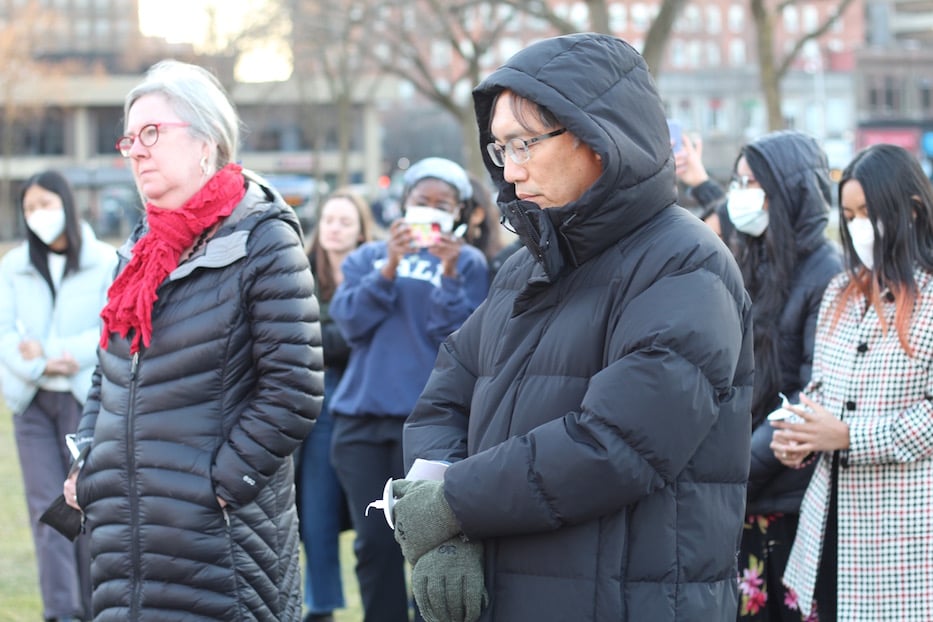
"This year is a good example of how history is not linear, but builds upon evolving ideas and stereotypes that continue to this day" Chow said. They recalled how their own family left China for Indonesia generations ago, "thinking there would be an escape from whiteness" after struggling under British Imperial rule. But they were not safe there either: Indonesia was home to the systematic killing of Chinese people under Suharto's authoritarian government.
They and Wong drew a line from the generational trauma that they and both of their families had faced to the policing of communities and people of color, from Asian American sex workers to Black trans women who are subject to an epidemic of violence each year.
"We cannot view Atlanta and stop Asian hate as a result of singular violence, of singular hate, of singular identity," Chow said. "Atlanta was not an isolated event, but a cumulation of multiple issues that affect people beyond the label of Asian American. Even within the Asian American umbrella, some of us are affected more than others."
The solution, they continued, is an intersectional one—and does not include weaponizing Asian identity against other marginalized identities. They urged attendees to fight for and alongside those advocating for Black lives, LGBTQ+ rights, safe and affordable housing, safe avenues for sex work, and police abolition. When she took the mic later in the program, Black Lives Matter New Haven Co-Founder Ala Ochumare echoed those words, her voice coasting over the Green.
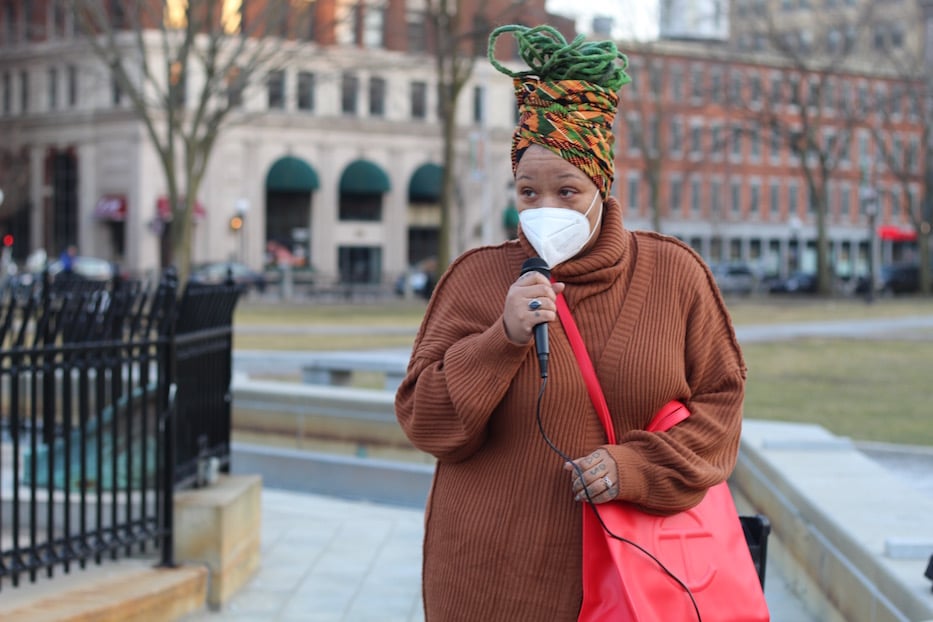
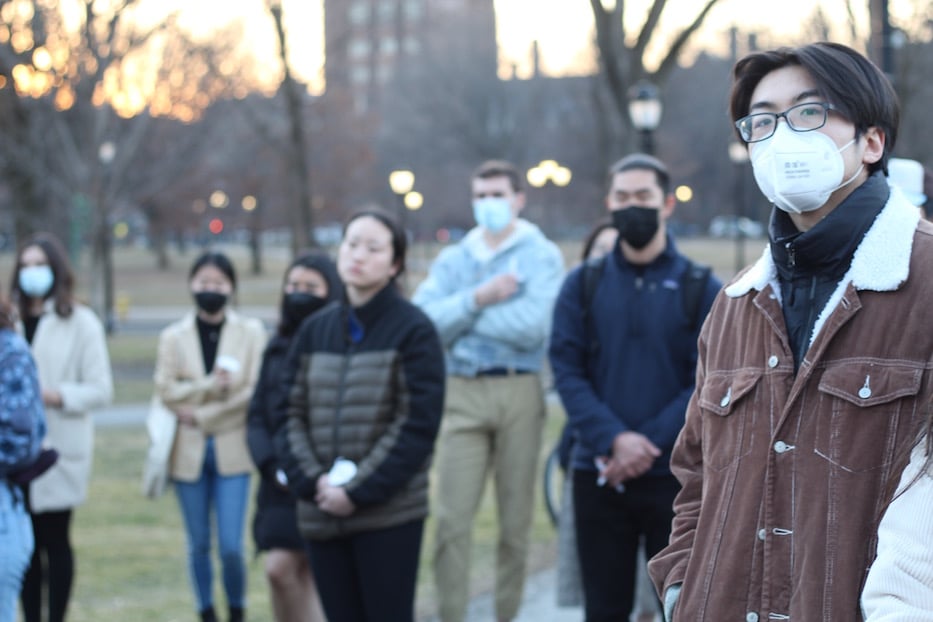
During an open mic portion of the evening, attendees created space for story, testimony, and poetry, some written carefully beforehand and others tumbling out in the moment. Wong, who does work with the Xīn Shēng Project to fight disinformation, read a letter from a sex worker who wished to remain anonymous. In it, the letter writer expressed concern not only for themselves and fellow sex workers, but the others penalized by the increased presence of law enforcement in their communities.
Sheena Kwon, a freshman at Yale University and a member of Korean American Students at Yale, reminded attendees that March 16 is now a day of mourning and commemoration for many Koreans, because four of the eight victims were Korean. Seven of them were women.
In the aftermath of the shooting, she was shaken by not just the violence and immediacy of the act—that the women "looked like they could be a part of my family"—but also by what she saw as the media’s failure to honor each victim. Following the shootings, reporters mispronounced and sometimes misprinted names, mixed up photos, and gave airtime to the law enforcement officials insisting that the shooting had not been a hate crime.
"It's important to honor and recognize those who lost their lives, to struggle to forget, or let anyone else do so, but also to act by creating community resources that help support those vulnerable, and aim to protect against these attacks."
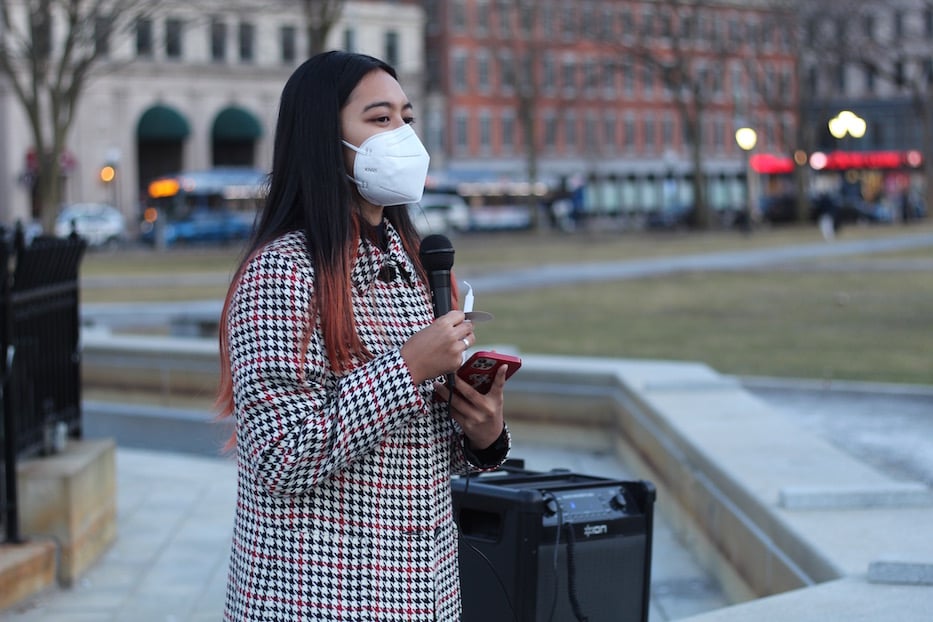
Hendrawan.
A Javanese-Indonesian American and freshman at Yale, Hendrawan took attendees back to their childhood in Hawaii, where they were born and raised. In middle school, a white, male science teacher kept insisting that he'd seen them in the newspaper. Hendrawan would answer: no, that wasn't possible. Until he brought in a clipping of a woman wearing glasses.
It wasn't the same person at all. It was an adult woman sporting a pair of sleek frames in an advertisement. The teacher insisted that it was his student. "He said, 'No, both of you wear glasses and both of you are exotic," they recalled.
Hendrawan felt like the world had been flipped upside down.
"I think about that," they said.
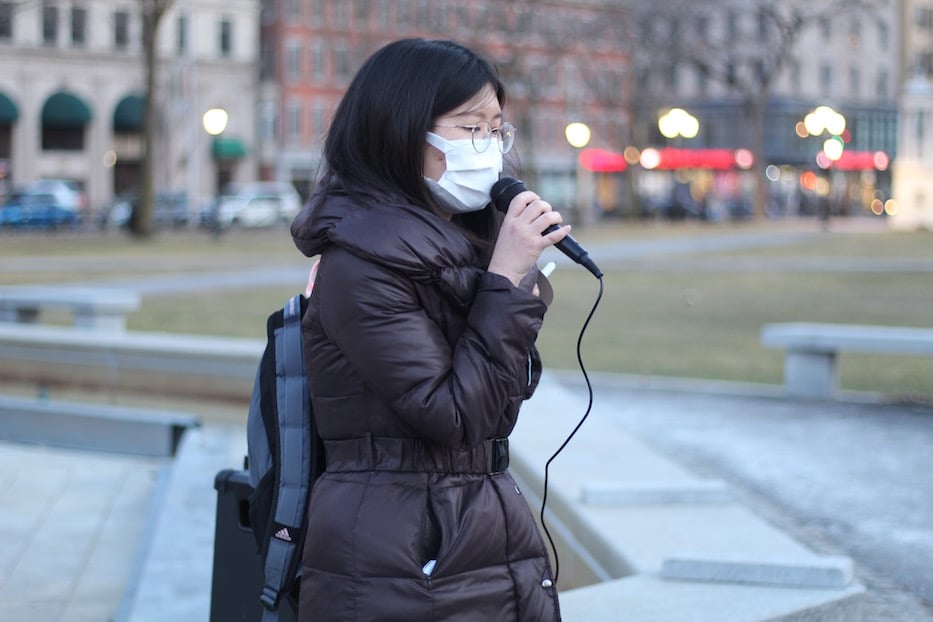
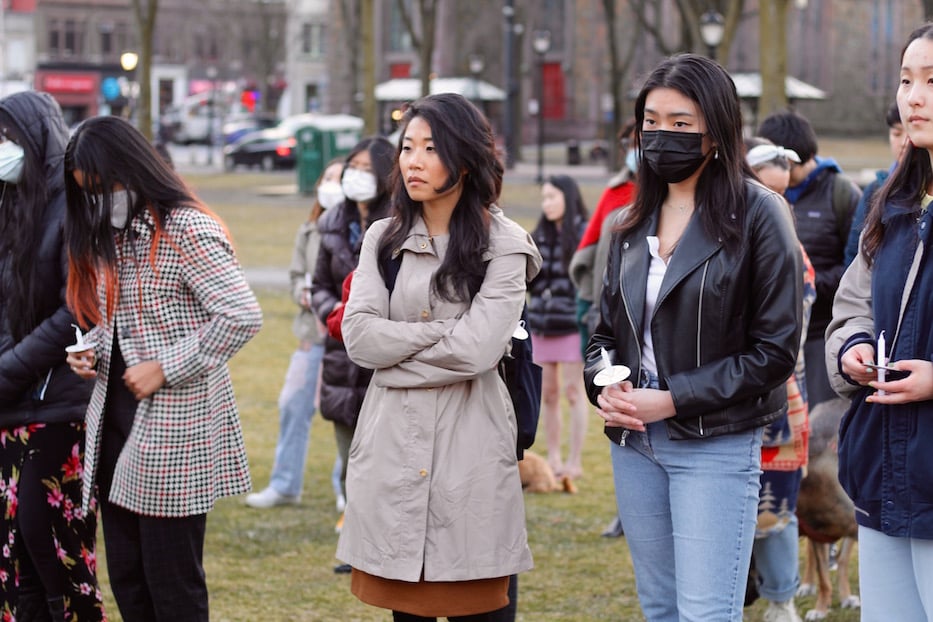
Top: Karis Haewon Ryu, a first-year student at the Yale Divinity School. Bottom: Attendees.
Speaking close to the end of the evening, Divinity School student Karis Ryu recalled growing up as the child of South Korean parents who were naturalized U.S. citizens and affiliated with the U.S. military. As a child of a military chaplain growing up in the U.S., she was often extremely isolated because of who she was.
“There were moments of just crying and not knowing why I was crying,” she said. During her teens, her dad’s work brought them back to Korea, where she began to develop a strong belief in demilitarizing U.S. imperial involvement in the Pacific.
When the shootings took place in Atlanta last year, she was a senior at Brown University. She recalled attending a prayer meeting with a friend, and grieving publicly because they were so emotionally distraught. Hours later, she and the friend received a message from a male member of the same affinity group. He asked for a piece of writing on how traumatized they felt.
“We felt so upset that work was being demanded of us because we reacted emotionally to it,” she said.
Speaking openly to the group, she addressed the need for community members to hold each other up, looking at men in particular. This year, she found a long overdue sense of solace in a gathering for Asian-American women at Elm City Vineyard. This time, instead of asking her for work, men showed up. They covered the cost of the event. They took care of details. They made space.
“And that was a balm for my soul,” she said.
Watch more from the vigil above.

